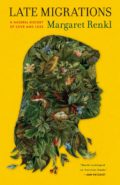
Review: Late Migrations: A Natural History of Love and Loss by Margaret Renkl
Reviewed by Nancy Posey

Late Migrations: A Natural History of Love and Loss
Essays by Margaret Renkl
Milkweed editions, 2019
$24.00, 111 pp.
ISBN-13: 978-1-57131-378-2
The overwhelming crowd at the launch party for Margaret Renkl’s Late Migrations at Parnassus Books in Nashville and the subsequent buzz among book lovers are a quite a testament for a book that on the surface is hard to categorize. A collection of short essays, only one or two longer than three pages and some less than one, the book is part family history, part memoir, part nature journal.
Renkl is a contributing opinion writer for the New York Times, where her columns appear weekly. Though she is not a naturalist by training, her notes on activity in her own back yard communicate with readers on many levels. She’s a keen observer of birds, butterflies, and even critters considered pests or threats by many. Not content to watch passively, she knows the migratory patterns, nesting instincts, and food preferences of the life forms around her. She does what she can to make their stay safe and hospitable, all the while aware of the natural cycle of life and death.
Late Migrations, however, is much more than a book about the tentative relationship between humans and all other life. Renkl weaves in stories from her family before her birth, many as told by her grandmother in “Lower Alabama.” Hers is a story of at least five generations, with four often under one room. Many of the stories come from her own recollection of both childhood and her adult life. She describes times she shared a room with her great grandmother. Most poignant are the little details that add up to her mother’s life, often plagued by depression and finally living her last days just across the street from the author.
The arrangement and pacing of the individual essays are so artful that readers’ familiarity with Renkl develops the way any growing friendship might—piecing together the details and revelations for a sense of the whole. In one essay, “Things I Knew When I Was Six: Lower Alabama 1967,” the list moves from facts about flowers, grasshoppers, and worms to the final item: “If your mother is crying and cannot stop, there’s a little blue pill in the bathroom that will help her sleep” (35). The companion piece that follows, “Things I Didn’t Know. . .” ends “Your mother’s tears are not your fault” (37).
The “Imperfect-Family Beatitudes,” first published in Oxford American magazine, strikes a perfect balance between humor and tenderness: The list includes the “braless mother who arrives at the school pickup line wearing pink plastic curlers. . . who won’t hesitate to get out of the car if she must. . . . will never be kept waiting,” as well as the parents “whose final words on leaving. . . are always ‘I love you’” who “will leave behind children who are lost and still found, broken and, somehow, still whole” (70).
Readers will find themselves commiserating with Renkl’s quest for the squirrel-proof bird feeder and celebrating her recognition of the simple truth, even after her mother’s death, that “the world will go on” (209). Late Migrations is the kind of book that has serious readers pausing before even finishing to recommend the book to others for whom it seems just right. With the addition of illustrations by her brother, collage artist Billy Renkl, Late Migrations earns its place on the bookshelf of any serious bibliophile. Those who tend to share may want to pick up extra copies as gifts so their own copies won’t get away.
Nancy Posey lives in Brentwood, TN, where she is an adjunct English professor after retiring from full-time teaching in North Carolina. An avid reader, she participates in two book clubs and blogs about books at discriminatingreader.com. She also writes poetry, plays the mandolin, and always enjoys learning something new.

Well deserved recognition. Great review which has enticed me to read this book.